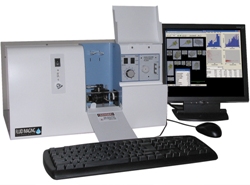Apr 2 2010
Fluid Imaging Technologies, Inc. of Yarmouth, Maine, USA, today announced that its FlowCAM® imaging particle analyzer will be a key component in a groundbreaking algae-to-biofuel research and commercial development project engineered and built by BioMarineFuels, Inc. (BMF) of Gulf Breeze, Florida, with other research participants.
 FlowCAM® imaging particle analyzer
FlowCAM® imaging particle analyzer
The FlowCAM, which combines rapid digital imaging with microscopy, will monitor performance of BMF's proprietary SolarMagnatron™, an algae biomass reactor that efficiently propagates lipid-containing algae to be processed into biodiesel and other high market value bio-fuels and chemicals.
The FlowCAM imaging particle analyzer was introduced to the emerging algae-to-biofuel market about two years ago, but according to Fluid Imaging's CEO, Kent Peterson, this is the first time the instrument will be used for algae photo-bioreactor performance analysis.
Mr. Peterson, commented, "The FlowCAM was originally developed for algal analysis, so it is optimally suited to serve in this burgeoning, global market. What's more, it is rewarding for Fluid Imaging to participate as part of an environmentally friendly solution to the growing problem of fossil fuel shortages and excessive carbon emissions, in that algae actually sequesters carbon as part of its life cycle to produce an oil content known as lipids."
BMF's SolarMagnatron™ photobioreactor essentially introduces CO2, sunlight, artificial sunlight, and microwave energy into a completely controlled 4000 gallon seawater containment vessel containing energy-rich micro-algae. The system stimulates rapid cell division and will produce high quantities of algal biomass for refinement into biofuels and other valuable chemicals like Omega 3. The FlowCAM, which has been used to rapidly image, count and characterize microorganisms in aquatic research since 1999, will provide real-time images and data on the size and concentration of the algae in the bioreactor.